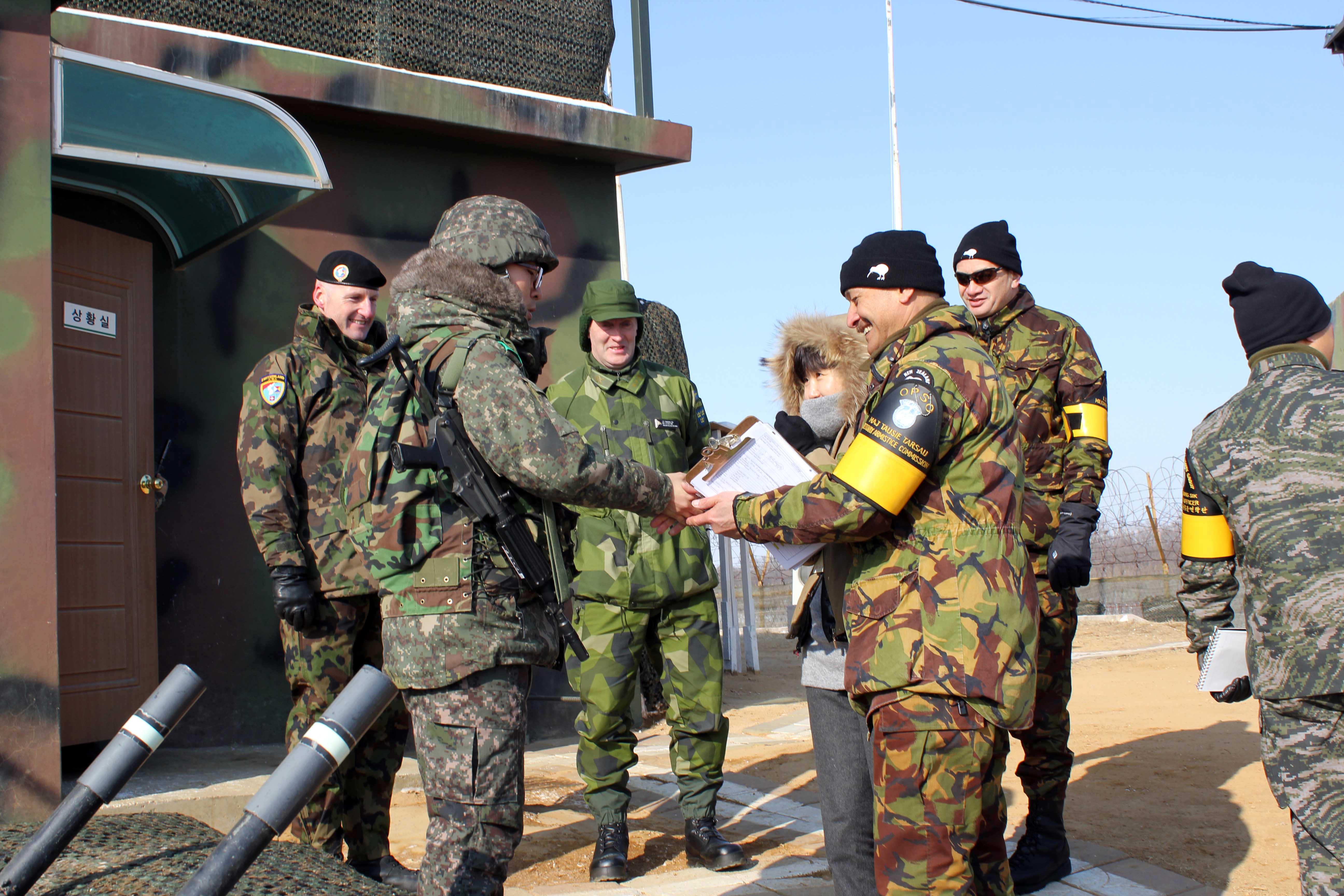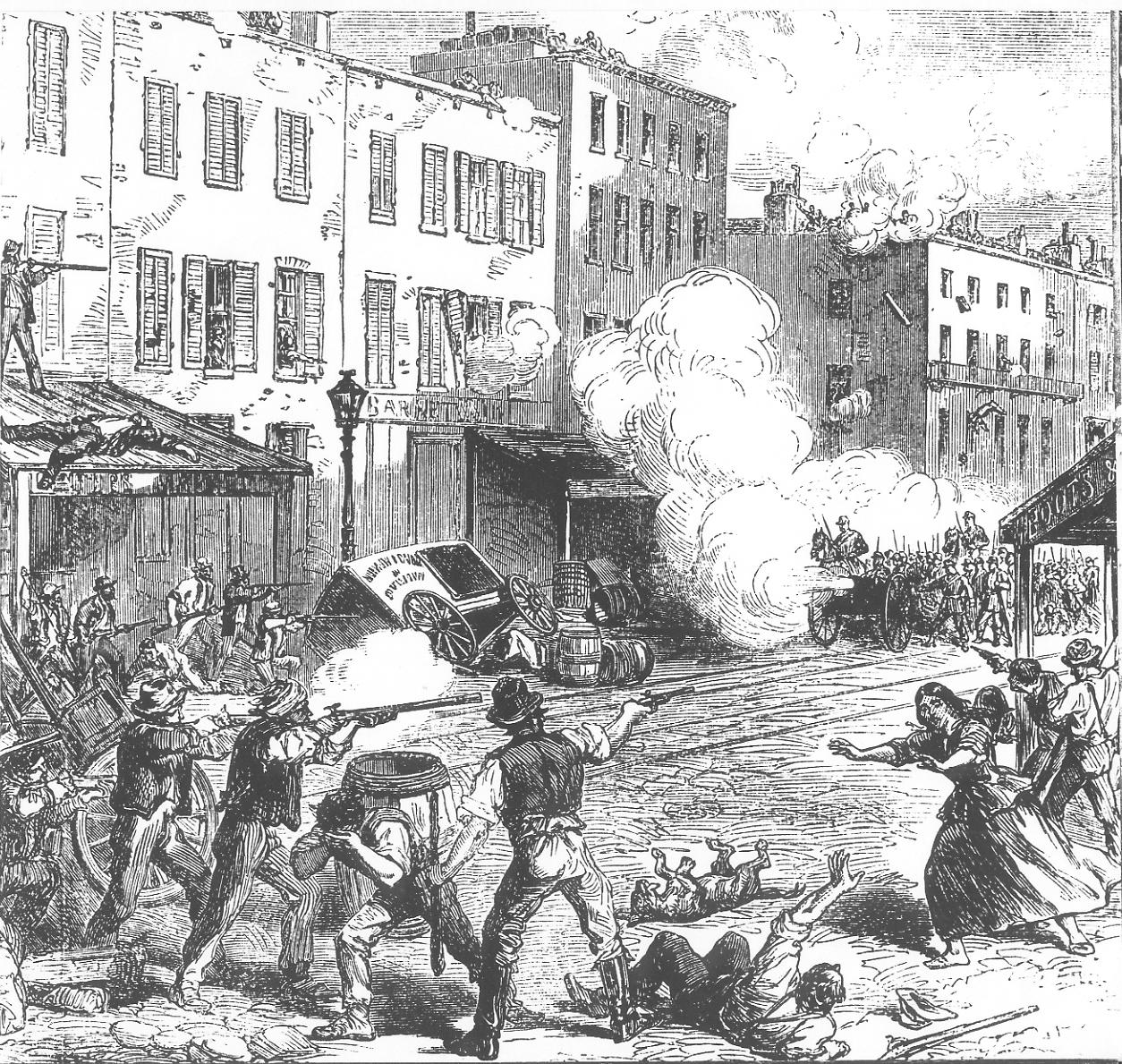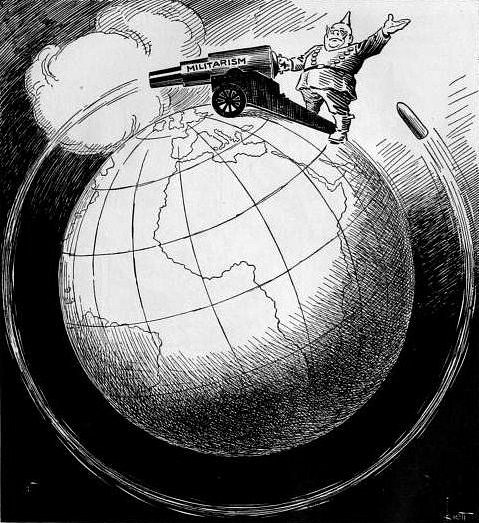|
Demilitarization
Demilitarisation or demilitarization may mean the reduction of state armed forces; it is the opposite of militarisation in many respects. For instance, the demilitarisation of Northern Ireland entailed the reduction of British security and military apparatuses. Demilitarisation in this sense is usually the result of a peace treaty ending a war or a major conflict. The principle is distinguished from demobilisation, which refers to the drastic voluntary reduction in the size of a victorious army. Definitions Demilitarisation was a policy in a number of countries after both world wars. In the aftermath of World War I, the United Kingdom greatly reduced its military strength, which is also referred to as disarmament. The resulting position of British military weakness during the rise of the Nazi regime in Germany was among the causes that led to the policy of appeasement. The conversion of a military or paramilitary force into a civilian one is also called demilitarisation. For e ... [...More Info...] [...Related Items...] OR: [Wikipedia] [Google] [Baidu] |
Demilitarised Zone
A demilitarized zone (DMZ or DZ) is an area in which treaties or agreements between states, military powers or contending groups forbid military installations, activities, or personnel. A DZ often lies along an established frontier or boundary between two or more military powers or alliances. A DZ may sometimes form a ''de facto'' international border, such as the Korean Demilitarized Zone. Other examples of demilitarized zones are a wide area between Iraq and Kuwait; Antarctica (preserved for scientific exploration and study); and outer space (space more than from the Earth's surface). Some zones remain demilitarized after an agreement has awarded control to a state which (under the DZ terms) had originally ceded its right to maintain military forces in the disputed territory. It is also possible for powers to agree on the demilitarization of a zone without formally settling their respective territorial claims, enabling the dispute to be resolved by peaceful means such as d ... [...More Info...] [...Related Items...] OR: [Wikipedia] [Google] [Baidu] |
Costa Rica
Costa Rica, officially the Republic of Costa Rica, is a country in Central America. It borders Nicaragua to the north, the Caribbean Sea to the northeast, Panama to the southeast, and the Pacific Ocean to the southwest, as well as Maritime boundary, maritime border with Ecuador to the south of Cocos Island. It has a population of around five million in a land area of nearly . An estimated people live in the capital and largest city, San José, Costa Rica, San José, with around two million people in the surrounding metropolitan area. The sovereign state is a Presidential system, presidential republic. It has a long-standing and stable Constitution of Costa Rica, constitutional democracy and a highly educated workforce. The country spends roughly 6.9% of its budget (2016) on education, compared to a global average of 4.4%. Its economy, once heavily dependent on agriculture, has diversified to include sectors such as finance, corporate services for foreign companies, pharmaceut ... [...More Info...] [...Related Items...] OR: [Wikipedia] [Google] [Baidu] |
Arms Control
Arms control is a term for international restrictions upon the development, production, stockpiling, proliferation and usage of small arms, conventional weapons, and weapons of mass destruction. Historically, arms control may apply to melee weapons (such as swords) before the invention of firearm. Arms control is typically exercised through the use of diplomacy which seeks to impose such limitations upon consenting participants through international treaties and agreements, although it may also comprise efforts by a nation or group of nations to enforce limitations upon a non-consenting country. Enactment Arms control treaties and agreements are often seen as a way to avoid costly arms races which could prove counter-productive to national aims and future peace. Some are used as ways to stop the spread of certain military technologies (such as nuclear weaponry or missile technology) in return for assurances to potential developers that they will not be victims of those tech ... [...More Info...] [...Related Items...] OR: [Wikipedia] [Google] [Baidu] |
Occupation Of Japan
Japan was occupied and administered by the Allies of World War II from the surrender of the Empire of Japan on September 2, 1945, at the war's end until the Treaty of San Francisco took effect on April 28, 1952. The occupation, led by the American military with support from the British Commonwealth and under the supervision of the Far Eastern Commission, involved a total of nearly one million Allied soldiers. The occupation was overseen by the US General Douglas MacArthur, who was appointed Supreme Commander for the Allied Powers by the US president Harry S. Truman; MacArthur was succeeded as supreme commander by General Matthew Ridgway in 1951. Unlike in the occupations of Germany and Austria, the Soviet Union had little to no influence in Japan, declining to participate because it did not want to place Soviet troops under MacArthur's direct command. This foreign presence marks the only time in the history of Japan that it has been occupied by a foreign power. Howe ... [...More Info...] [...Related Items...] OR: [Wikipedia] [Google] [Baidu] |
Article 9 Of The Japanese Constitution
is a clause in the Constitution of Japan outlawing war as a means to settle international disputes involving the state. The Constitution was drafted following the surrender of Japan in World War II. It came into effect on 3 May 1947 during the occupation of Japan by the Allies, which lasted until 28 April 1952. In its text, the state formally renounces the sovereign right of belligerency and aims at an international peace based on justice and order. The article also states that, to accomplish these aims, armed forces with war potential will not be maintained. The Constitution was imposed by U.S. military occupation (Supreme Commander for the Allied Powers) to prevent rearmament of Japan in the post–World War II period. This condition was a similar prohibition placed on post-war Germany, to be overseen by the United Kingdom, after World War I. However, Germany remilitarized anyway in the decades following despite this prohibition under the Weimar Republic and later Adolf Hitle ... [...More Info...] [...Related Items...] OR: [Wikipedia] [Google] [Baidu] |
Chemical Weapons Convention
The Chemical Weapons Convention (CWC), officially the Convention on the Prohibition of the Development, Production, Stockpiling and Use of Chemical Weapons and on their Destruction, is an arms control treaty administered by the Organisation for the Prohibition of Chemical Weapons (OPCW), an intergovernmental organization based in The Hague, Netherlands. The treaty entered into force on 29 April 1997. It prohibits the use of chemical weapons, and the large-scale development, production, stockpiling, or transfer of chemical weapons or their precursors, except for very limited purposes (research, medical, pharmaceutical or protective). The main obligation of member states under the convention is to effect this prohibition, as well as the destruction of all current chemical weapons. All destruction activities must take place under OPCW verification. 193 states have become parties to the CWC and accept its obligations. Israel has signed but not ratified the agreement, while three o ... [...More Info...] [...Related Items...] OR: [Wikipedia] [Google] [Baidu] |
Allied-occupied Germany
The entirety of Germany was occupied and administered by the Allies of World War II, from the Berlin Declaration on 5 June 1945 to the establishment of West Germany on 23 May 1949. Unlike occupied Japan, Nazi Germany was stripped of its sovereignty and its government was entirely dissolved. After Germany formally surrendered on Tuesday, 8 May 1945, the four countries representing the Allies (the United States, United Kingdom, Soviet Union, and France) asserted joint authority and sovereignty through the Allied Control Council (ACC). Germany after the war was a devastated country – roughly 80 percent of its infrastructure was in need of repair or reconstruction – which helped the idea that Germany was entering a new phase of history (" zero hour"). At first, Allied-occupied Germany was defined as all territories of Germany before the 1938 Nazi annexation of Austria. The Potsdam Agreement on 2 August 1945 defined the new eastern German border by giving Poland and the ... [...More Info...] [...Related Items...] OR: [Wikipedia] [Google] [Baidu] |
Corpus Separatum (Jerusalem)
''Corpus separatum'' (Latin for "Corpus separatum, separated body") was the internationalization proposal for Jerusalem and its surrounding area as part of the United Nations Partition Plan for Palestine. It was adopted by the United Nations General Assembly with a two-thirds majority in November 1947. According to the Partition Plan, the city of Jerusalem would be brought under international governance, conferring it a special status due to its shared importance for the Abrahamic religions. The legal base ("Statute") for this arrangement was to be reviewed after ten years and put to a referendum. The ''corpus separatum'' was again one of the main issues of the post-war Lausanne Conference of 1949, besides the borders of Israel and the question of the Palestinian right of return. The Partition Plan was not implemented, being firstly rejected by Palestinians, Palestinian and Arab League, other Arab leaders and then overtaken by the 1948 Arab–Israeli War, which left Jerusalem spli ... [...More Info...] [...Related Items...] OR: [Wikipedia] [Google] [Baidu] |
Demobilisation
Demobilization or demobilisation (see spelling differences) is the process of standing down a nation's armed forces from combat-ready status. This may be as a result of victory in war, or because a crisis has been peacefully resolved and military force is no longer necessary. The opposite of demobilization is mobilization, which is the act of calling up forces for active military service. Forceful demobilization of a defeated enemy is called demilitarization. The United Nations defines demobilization as "a multifaceted process that officially certifies an individual's change of status from being a member of a military grouping of some kind to being a civilian". Persons undergoing demobilization are removed from the command and control of their armed force and group and the transformation from a military mindset to that of a civilian begins. Although combatants become civilians when they acquire their official discharge documents the mental connection and formal ties to their mi ... [...More Info...] [...Related Items...] OR: [Wikipedia] [Google] [Baidu] |
Japanese Battleship Hiei
was a warship of the Imperial Japanese Navy during World War I and World War II. Designed by British naval architect George Thurston, she was the second launched of four s, among the most heavily armed ships in any navy when built. Laid down in 1911 at the Yokosuka Naval Arsenal, ''Hiei'' was formally ship commissioning, commissioned in 1914. She patrolled off the Chinese coast on several occasions during World War I, and helped with rescue efforts following the 1923 Great Kantō earthquake. Starting in 1929, ''Hiei'' was converted to a gunnery training ship to avoid being scrapped under the terms of the Washington Naval Treaty. She served as Emperor Hirohito's transport in the mid-1930s. After the treaty fell apart in 1937, she underwent a full-scale reconstruction that completely rebuilt her superstructure, upgraded her powerplant, and equipped her with Aircraft catapult, launch catapults for floatplanes. Now fast enough to accompany Japan's growing fleet of aircraft carrie ... [...More Info...] [...Related Items...] OR: [Wikipedia] [Google] [Baidu] |
Anti-war Movement
An anti-war movement is a social movement in opposition to one or more nations' decision to start or carry on an armed conflict. The term ''anti-war'' can also refer to pacifism, which is the opposition to all use of military force during conflicts, or to anti-war books, paintings, and other works of art. Some activists distinguish between anti-war movements and peace movements. Anti-war activists work through protest and other grassroots means to attempt to pressure a government (or governments) to put an end to a particular war or conflict or to prevent one from arising. History American Revolutionary War Substantial opposition to British war intervention in America led the British House of Commons on 27 February 1783 to vote against further war in America, paving the way for the Second Rockingham ministry and the Peace of Paris. Antebellum United States Substantial antiwar sentiment developed in the United States roughly between the end of the War of 1812 and the com ... [...More Info...] [...Related Items...] OR: [Wikipedia] [Google] [Baidu] |
Antimilitarism
Antimilitarism (also spelt anti-militarism) is a doctrine that opposes war, relying heavily on a critical theory of imperialism and was an explicit goal of the First and Second International. Whereas pacifism is the doctrine that disputes (especially between countries) should be settled without recourse to violence, Paul B. Miller defines anti-militarism as "ideology and activities...aimed at reducing the civil power of the military and ultimately, preventing international war". Cynthia Cockburn defines an anti-militarist movement as one opposed to " military rule, high military expenditure or the imposition of foreign bases in their country". Martin Ceadel points out that anti-militarism is sometimes equated with pacificism—general opposition to war or violence, except in cases where force is deemed necessary to advance the cause of peace.Martin Ceadel, ''Thinking about peace and war''. Oxford, Oxford University Press, 1987. , p. 101. Distinction between antimilitarism and p ... [...More Info...] [...Related Items...] OR: [Wikipedia] [Google] [Baidu] |







